In the dynamic realm of logistics and transportation, the selection of the right tractor trailer is pivotal to operational efficiency and business success. At CarMax Trailer, a division of CarMax Vehicle, we understand the critical role that diverse tractor trailer types play in meeting varied shipping needs. This comprehensive guide delves into the multitude of tractor trailer types, examining their unique features, applications, and benefits to help you make informed decisions for your fleet.
Table of Contents
- Introduction to Tractor Trailers
- Classification by Structure and Purpose
- Classification by Axles and Load Capacity
- Material Composition
- Technological Innovations
- Selecting the Right Tractor Trailer
- Advantages and Disadvantages of Various Types
- Why Choose CarMax Trailer
- Conclusion
- Frequently Asked Questions
Introduction to Tractor Trailers
Tractor trailers, often referred to as semi-trucks or big rigs, are the backbone of the freight transport industry. Their versatility in hauling a wide array of goods makes them indispensable for businesses across multiple sectors. Understanding the different types of tractor trailers available is essential for optimizing transportation efficiency, reducing costs, and ensuring the safe delivery of goods. At CarMax Trailer, we specialize in manufacturing a diverse range of tractor trailers tailored to meet specific logistical demands.

Classification by Structure and Purpose
Tractor trailers can be categorized based on their structural design and the specific purposes they serve. Each type is engineered to handle different cargo types, environmental conditions, and transportation requirements.
Dry Van Trailers
Overview: Dry van trailers are the most common type of tractor trailer, characterized by their enclosed rectangular shape. They are primarily used for transporting non-perishable goods shielded from external elements.
Key Features:
- Enclosed Structure: Protects cargo from weather, theft, and damage.
- Standard Dimensions: Typically, 53 feet in length, offering ample space.
- Versatile Use: Suitable for a wide range of products, including electronics, furniture, and packaged goods.
Advantages:
- Enhanced security and protection.
- Versatile for various cargo types.
- Efficient loading and unloading through rear doors.
Refrigerated Trailers (Reefers)
Overview: Refrigerated trailers, commonly known as reefers, are designed to transport perishable goods that require temperature-controlled environments.
Key Features:
- Integrated Cooling Systems: Maintain specific temperature ranges.
- Insulated Construction: Minimizes temperature fluctuations.
- Advanced Monitoring: Equipped with telemetry for real-time temperature tracking.
Applications:
- Fresh produce, dairy products, pharmaceuticals, and frozen items.
Advantages:
- Ensures product integrity and freshness.
- Compliance with food safety standards.
- Reduces spoilage and waste.
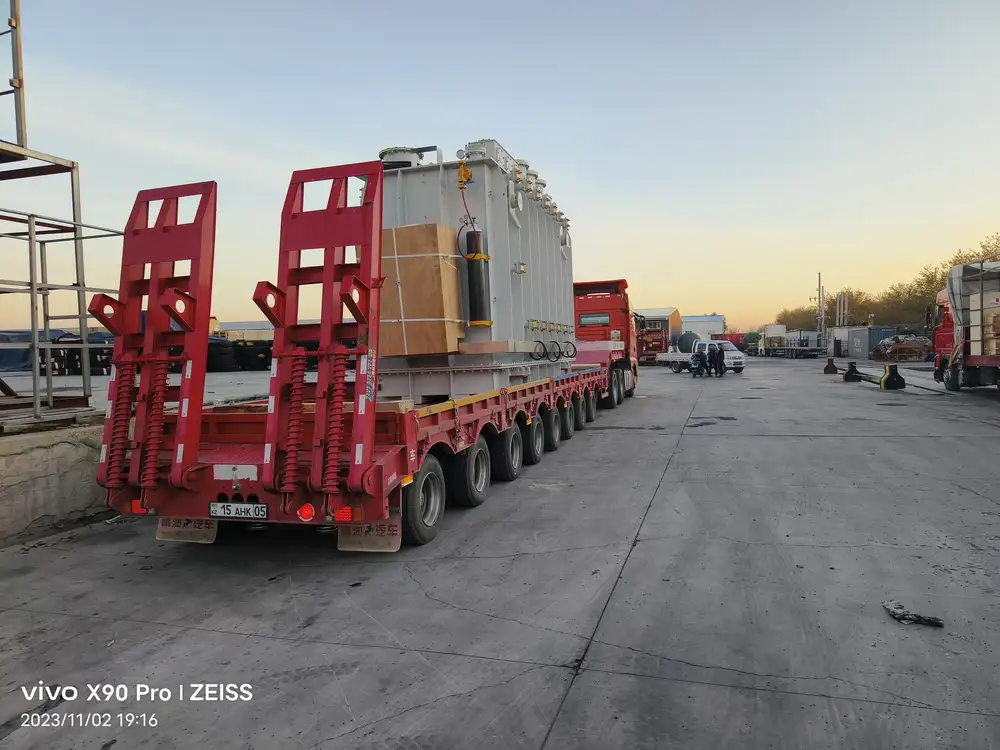
Flatbed Trailers
Overview: Flatbed trailers consist of a flat, open platform without side walls, making them ideal for oversized or irregularly shaped cargo.
Key Features:
- Open Design: Facilitates easy loading and unloading from all sides.
- Durable Construction: Built to withstand heavy loads and rough handling.
- Versatile Attachment Points: Supports various securing mechanisms for different cargo types.
Applications:
- Construction materials, machinery, vehicles, and timber.
Advantages:
- Flexibility in loading a wide range of cargo.
- Quick and easy access for loading and unloading.
- Suitable for heavy and bulk items.
Tanker Trailers
Overview: Tanker trailers are specialized for transporting liquids, gases, and other fluid materials. They feature a cylindrical tank mounted on the trailer frame.
Key Features:
- Sealed Tanks: Prevent leakage and contamination.
- Material Compatibility: Constructed from materials suitable for different liquids (e.g., steel, stainless steel, aluminum).
- Safety Features: Equipped with pressure release valves and grounding systems for hazardous materials.
Applications:
- Fuel, chemicals, milk, and liquid foods.
Advantages:
- Safe and efficient transportation of fluids.
- Customizable tank materials for various substances.
- Compliance with safety and environmental regulations.
Step Deck (Lowboy) Trailers
Overview: Step deck trailers, also known as lowboys, feature a two-tiered deck that allows for the transportation of taller or heavier loads.
Key Features:
- Lower Deck Height: Facilitates the transport of oversized and heavy equipment.
- Adjustable Landing Gear: Ensures stability during loading and transit.
- High Weight Capacity: Supports heavy payloads without compromising safety.
Applications:
- Construction equipment, industrial machinery, and large vehicles.
Advantages:
- Ability to transport taller and heavier cargo.
- Enhanced stability for heavy loads.
- Efficient use of deck space.
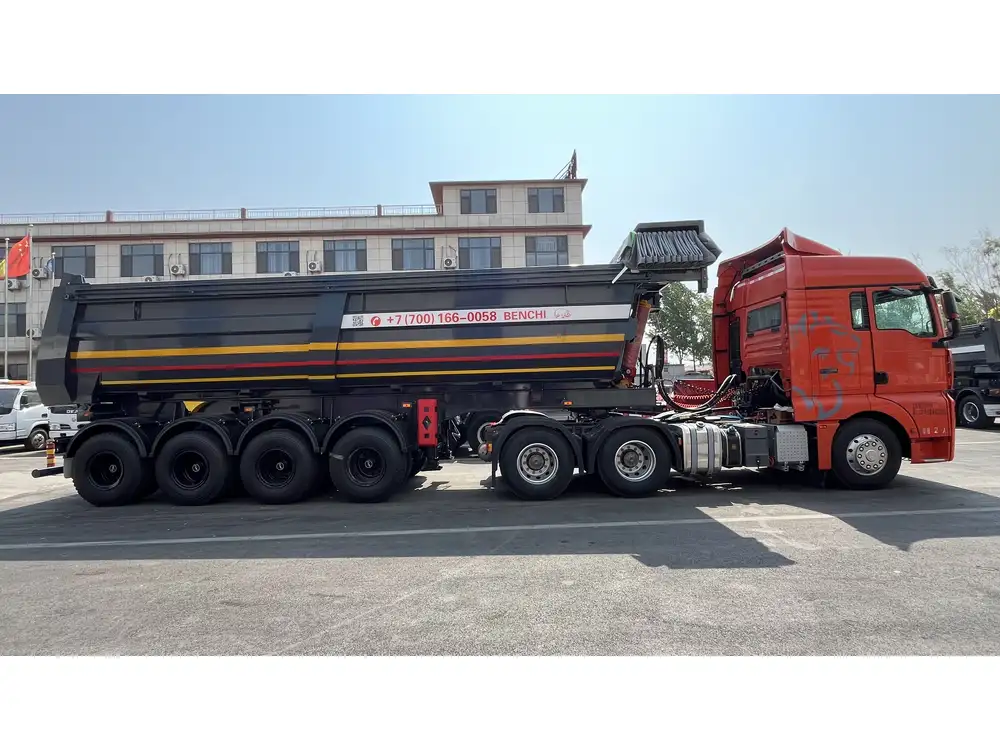
Curtain Side Trailers
Overview: Curtain side trailers combine the benefits of dry vans and flatbeds, featuring flexible curtains instead of rigid sidewalls.
Key Features:
- Flexible Curtains: Allow for easy access and visibility of cargo.
- Rapid Loading and Unloading: Side doors enable quick operations.
- Weather Protection: Shields cargo from external elements while allowing airflow.
Applications:
- Palletized goods, bulk items, and goods requiring quick access.
Advantages:
- Increased loading efficiency with side access.
- Versatile for a variety of cargo types.
- Better visibility and airflow control.
Double Drop Trailers
Overview: Double drop trailers have two lowered sections, allowing for the transportation of exceptionally tall or heavy loads.
Key Features:
- Two Drop Points: Lower deck heights to accommodate oversized cargo.
- Increased Weight Distribution: Enhances load stability and safety.
- Customizable Dimensions: Tailored to specific cargo requirements.
Applications:
- Large industrial equipment, wind turbine components, and other oversized machinery.
Advantages:
- Capable of transporting extremely tall or heavy items.
- Improved load distribution for safer transit.
- Flexible customization for specialized needs.
Specialized Trailers
Overview: In addition to the common types, there are specialized trailers designed for niche applications, such as livestock transport, bulk grain hauling, and more.
Key Features:
- Customized Designs: Engineered to meet specific industry requirements.
- Enhanced Safety Features: Tailored to protect unique cargo types.
- Regulatory Compliance: Meets industry-specific transportation standards.
Applications:
- Livestock, bulk commodities, oversized machinery, and hazardous materials.
Advantages:
- Tailored solutions for unique transportation needs.
- Enhanced safety and compliance for specialized cargo.
- Increased efficiency in niche markets.
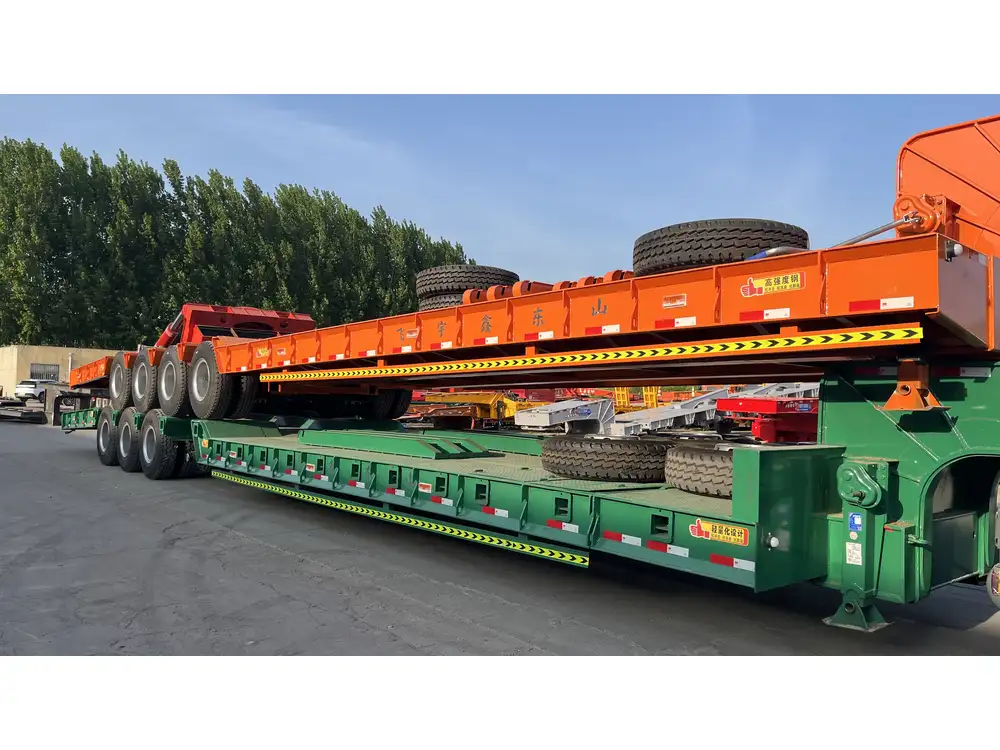
Classification by Axles and Load Capacity
Tractor trailers are also categorized based on the number of axles and their corresponding load capacities. This classification impacts the trailer’s ability to carry different weights and comply with road regulations.
Single-Axle Trailers
Overview: Equipped with one axle mounted on the trailer, suitable for lighter loads.
Load Capacity: Typically up to 20,000 pounds.
Applications: Light machinery, smaller freight shipments.
Advantages:
- Lower initial cost.
- Better maneuverability.
- Reduced fuel consumption.
Tandem-Axle Trailers
Overview: Feature two axles on the trailer, enhancing load distribution and stability.
Load Capacity: Generally between 40,000 to 80,000 pounds.
Applications: Standard freight, bulk materials, container transport.
Advantages:
- Higher load capacity.
- Improved stability with heavier loads.
- Compliance with most interstate regulations.

Triple-Axle and Beyond
Overview: Trailers with three or more axles, designed for maximum load capacities and specialized heavy-haul applications.
Load Capacity: Can exceed 100,000 pounds.
Applications: Oversized industrial equipment, large-scale construction materials.
Advantages:
- Maximum load carrying capabilities.
- Enhanced stability for extremely heavy loads.
- Customized configurations for specific transportation needs.
Material Composition
The materials used in constructing tractor trailers significantly influence durability, weight, and maintenance requirements.
Steel Trailers
Advantages:
- High strength and durability.
- Cost-effective for heavy-duty applications.
- Resistant to wear and tear.
Disadvantages:
- Heavier than alternative materials, potentially reducing fuel efficiency.
- Prone to corrosion if not properly maintained.

Aluminum Trailers
Advantages:
- Lightweight, enhancing fuel efficiency.
- Resistant to rust and corrosion.
- Easier to repair with less specialized equipment.
Disadvantages:
- Generally more expensive upfront.
- May be less durable under extreme heavy loads compared to steel.
Composite Materials
Advantages:
- Combining benefits of steel and aluminum.
- Improved strength-to-weight ratio.
- Enhanced customization options.
Disadvantages:
- Higher production costs.
- Limited availability in the market.
Technological Innovations
Modern tractor trailers incorporate advanced technologies to improve efficiency, safety, and performance.
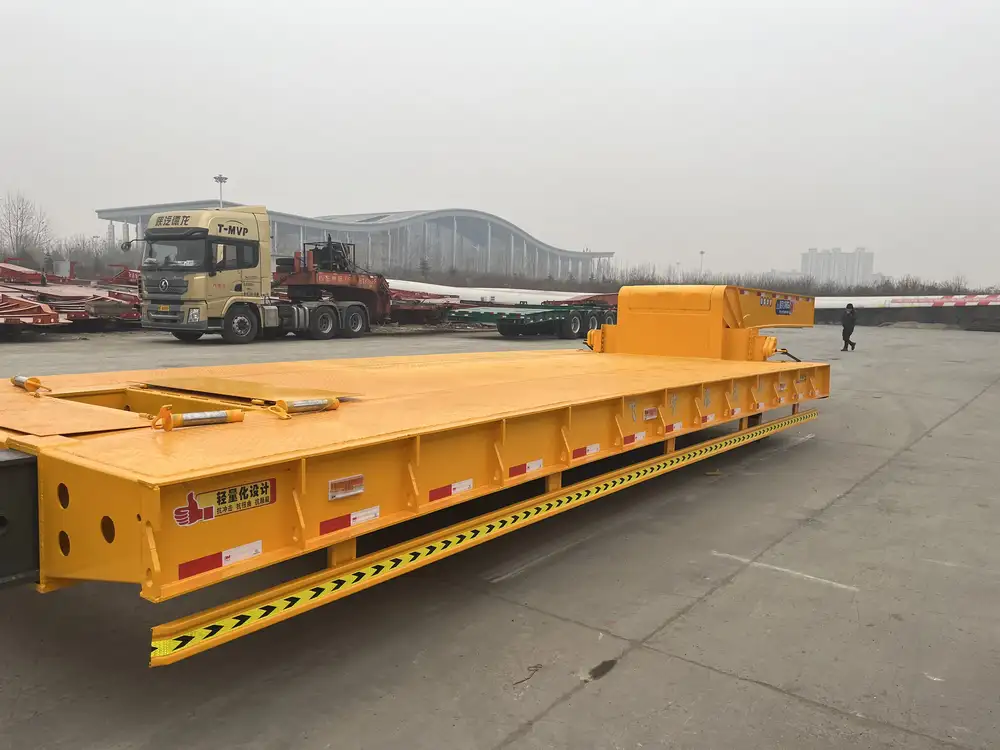
Air Suspension Systems
Benefits:
- Enhanced ride comfort.
- Better load distribution.
- Reduced wear on components.
Telematics and GPS Tracking
Benefits:
- Real-time tracking of trailer location and status.
- Improved route optimization.
- Enhanced security and theft prevention.
Aerodynamic Enhancements
Benefits:
- Reduced wind resistance.
- Improved fuel efficiency.
- Lower operational costs.
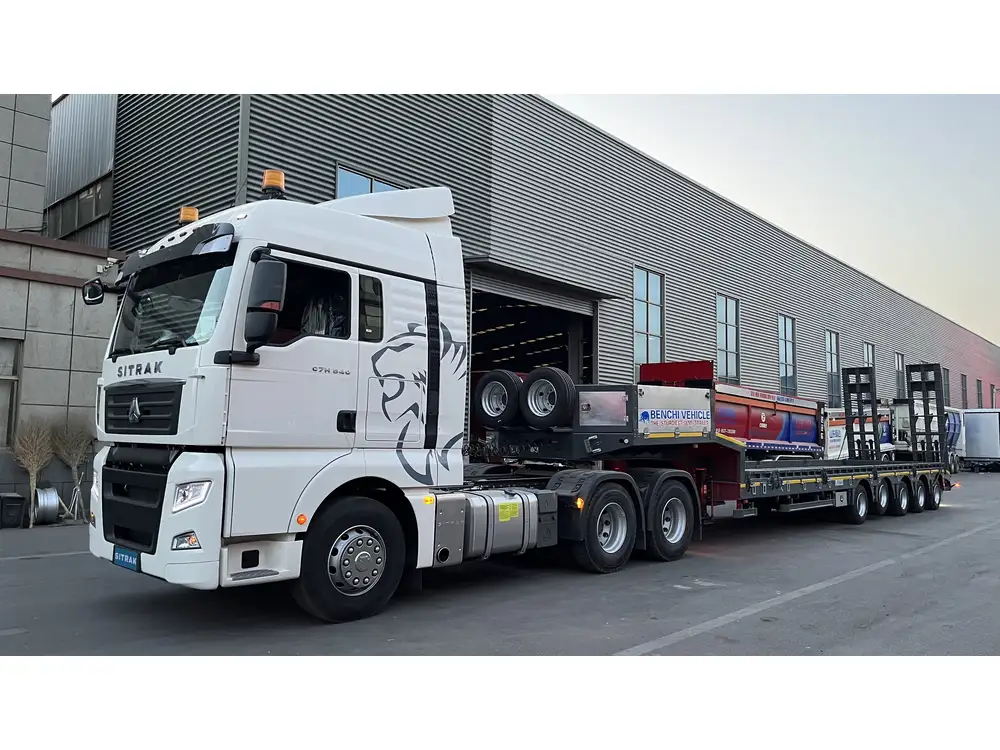
Automated Safety Features
Benefits:
- Collision avoidance systems.
- Lane departure warnings.
- Automated braking systems.
Selecting the Right Tractor Trailer
Choosing the appropriate tractor trailer involves evaluating several factors to ensure alignment with your business needs and operational demands.
Cargo Type
Different trailers are designed to handle specific types of cargo. Assess the nature of your goods—whether they are perishable, oversized, liquid, or require special handling—to determine the most suitable trailer type.
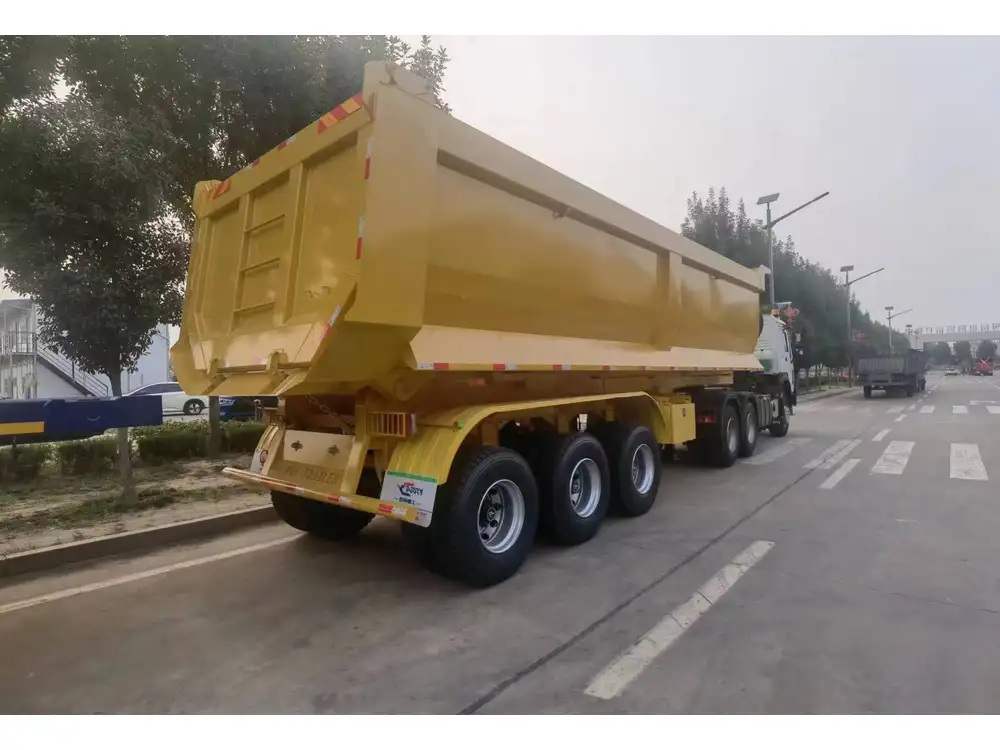
Distance and Route
Consider the distances your trailers will cover and the routes they will traverse. Long-haul routes may benefit from fuel-efficient designs, while routes with tighter turns might require more maneuverable trailers.
Regulatory Compliance
Ensure that the trailer type complies with local, state, and federal regulations, including weight limits, safety standards, and emission controls.
Advantages and Disadvantages of Various Types
Understanding the pros and cons of each trailer type helps in making strategic decisions that enhance operational efficiency.
| Trailer Type | Advantages | Disadvantages |
|---|---|---|
| Dry Van | High security, versatility, protection from elements | Limited to non-perishable goods |
| Reefers | Temperature control, extends product shelf life | Higher initial cost, increased maintenance |
| Flatbed | Flexibility in loading, accommodates oversized cargo | Less protection from weather and theft |
| Tanker | Safe transport of liquids, customizable for different fluids | Requires specialized handling and maintenance |
| Step Deck (Lowboy) | Transports heavy and tall loads, enhanced stability | Limited to specific cargo types |
| Curtain Side | Quick loading/unloading, versatile cargo handling | Less secure than enclosed trailers |
| Double Drop | Handles extremely oversized loads, improved load distribution | Limited availability, higher cost |
| Specialized | Tailored solutions for niche markets, enhanced safety for specific cargo types | Higher production costs, limited market applicability |

Why Choose CarMax Trailer
At CarMax Trailer, a subsidiary of CarMax Vehicle, we pride ourselves on delivering top-tier tractor trailers that cater to diverse transportation needs. Our commitment to quality, innovation, and customer satisfaction sets us apart in the industry.
Key Benefits:
- Customized Solutions: We offer tailored trailer designs to meet specific business requirements.
- Quality Manufacturing: Utilizing premium materials and advanced manufacturing processes ensures durability and performance.
- Technological Integration: Our trailers feature the latest technological advancements for enhanced efficiency and safety.
- Comprehensive Support: From selection to maintenance, our dedicated support team assists you every step of the way.
- Competitive Pricing: We provide cost-effective solutions without compromising on quality.
Conclusion
Selecting the right type of tractor trailer is a critical decision that impacts your logistics operations, cost efficiency, and overall business performance. At CarMax Trailer, we offer a diverse range of tractor trailers engineered to meet the unique demands of various industries. By understanding the different types available and evaluating your specific needs, you can optimize your fleet for maximum efficiency and reliability. Trust CarMax Trailer to provide you with the best-in-class tractor trailers that drive your business forward.

Frequently Asked Questions
1. What factors should I consider when choosing a tractor trailer type?
When selecting a tractor trailer, consider the nature of your cargo, load capacity requirements, distance and routes, regulatory compliance, and any specific industry needs. Evaluating these factors ensures that the trailer type aligns with your operational goals and transportation demands.
2. How can I maintain the longevity of my tractor trailers?
Regular maintenance is key to extending the life of your tractor trailers. This includes routine inspections, timely repairs, proper cleaning, and adhering to manufacturer-recommended maintenance schedules. Investing in high-quality materials and technologies, as offered by CarMax Trailer, also contributes to enhanced durability.

3. What are the latest technological advancements in tractor trailers?
Modern tractor trailers incorporate various technological innovations such as air suspension systems for better ride comfort, telematics and GPS tracking for real-time monitoring, aerodynamic enhancements for fuel efficiency, and automated safety features like collision avoidance and lane departure warnings. These advancements improve overall performance and safety.
4. Can CarMax Trailer customize a tractor trailer to meet specific requirements?
Yes, CarMax Trailer specializes in providing customized tractor trailer solutions tailored to meet unique business and transportation needs. Our team works closely with clients to design and manufacture trailers that align with their specific requirements, ensuring optimal performance and efficiency.
5. What are the environmental considerations for different trailer types?
Environmental considerations include fuel efficiency, emission controls, and the materials used in trailer construction. Trailers made with lightweight materials like aluminum can enhance fuel efficiency, while those equipped with aerodynamic features reduce wind resistance and emissions. Additionally, ensuring proper maintenance and utilizing modern technologies contribute to minimizing the environmental impact.



